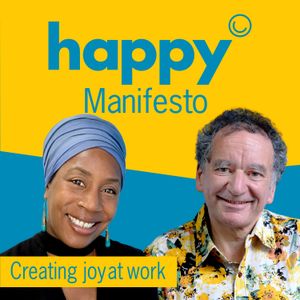Recent Episodes
What are you prepared to do, to get the thing you want?
Heather R. Younger, a TEDx speaker, author, and leadership expert, chats with our hosts, Henry and Maureen, discussing self-leadership and its vital role in effective leadership.
Heather shares her personal journey, including a pivotal realisation about prioritising her own well-being, and offers practical self-leadership habits. You'll hear how caring leadership can boost productivity and recounts a story of compassionate leadership during her layoff experience.
Our conversation covers overcoming imposter syndrome, building workplace trust, and fostering team bonds. Heather’s insights reveal that leading oneself with empathy and clarity is foundational to creating resilient, joyful workplaces.
Heather's tips for a happy workplace:
- Make sure that you have leaders taking care of themselves
- Make sure that you're listening in all the right ways
- Make sure that you promote 'team': accomplishments and productivity of teams
Links and resources mentioned in this episode:
- Heather's book The Art of Caring Leadership
- Happy Workplace

